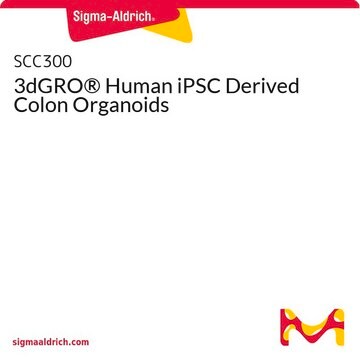SCC702
3dGRO® Pancreatic Organoids (PPTO.13)
Human
Synonyme(s) :
3dGRO® Pancreatic Organoids (PPTO.13), PDAC Organoid, Pancreatic Cancer Organoid, Pancreatic Ductal Organoid, Pancreatic Tumor Organoid
About This Item
Produits recommandés
product name
3dGRO® Pancreatic Organoids (PPTO.13),
Source biologique
human
Niveau de qualité
Conditionnement
vial of ≥1500 organoids vial
Fabricant/nom de marque
Millipore
Technique(s)
cell culture | stem cell: suitable
Conditions d'expédition
liquid nitrogen
Température de stockage
−196°C
Application
- Viability: >1500 viable organoids/vial
- Organoid Growth: Pass
- Cells are tested negative for infectious diseases by a Human Essential CLEAR panel by Charles River Animal Diagnostic Services.
- Mycoplasma Contamination: Negative
- STR Profile: Pass
Caractéristiques et avantages
Description de la cible
Recent breakthroughs in three-dimensional (3D) culture methods have led to the development of organoid culture platforms, which allow researchers to perform translational research on long-term in vitro cultures not limited by barriers present in 2D culture or animal models. We now offer a comprehensive collection of patient derived pancreatic ductal adenocarcinoma cancer (PDAC) organoids for cancer research and drug discovery applications.
Cell Line Characteristics
• Sex: Male
• Age: 73 Years
• Organ: Pancreas (Primary Tumor)
• Disease: Ductal Adenocarcinoma (KRAS mutation: G12R)
Stockage et stabilité
Autres remarques
Informations légales
Clause de non-responsabilité
Code de la classe de stockage
12 - Non Combustible Liquids
Classe de danger pour l'eau (WGK)
WGK 2
Point d'éclair (°F)
Not applicable
Point d'éclair (°C)
Not applicable
Certificats d'analyse (COA)
Recherchez un Certificats d'analyse (COA) en saisissant le numéro de lot du produit. Les numéros de lot figurent sur l'étiquette du produit après les mots "Lot" ou "Batch".
Déjà en possession de ce produit ?
Retrouvez la documentation relative aux produits que vous avez récemment achetés dans la Bibliothèque de documents.
Notre équipe de scientifiques dispose d'une expérience dans tous les secteurs de la recherche, notamment en sciences de la vie, science des matériaux, synthèse chimique, chromatographie, analyse et dans de nombreux autres domaines..
Contacter notre Service technique


![N-[3-(2-Furyl)acryloyl]-Leu-Gly-Pro-Ala](/deepweb/assets/sigmaaldrich/product/structures/805/876/96b5fb57-71c8-4c6b-b5d2-fafe7374cd85/640/96b5fb57-71c8-4c6b-b5d2-fafe7374cd85.png)





